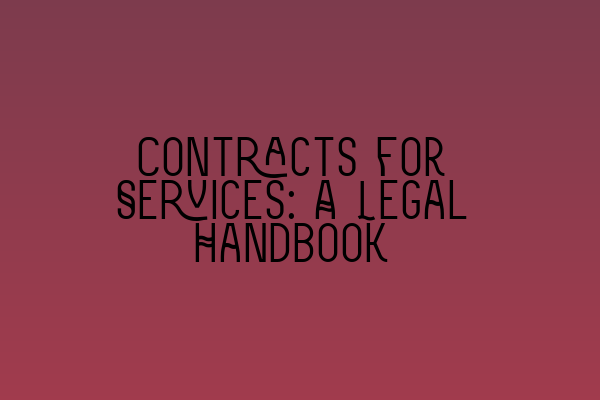Contracts for Services: A Legal Handbook
Welcome to our comprehensive guide on Contracts for Services. In this legal handbook, we will explore the essential aspects of creating, interpreting, and enforcing contracts for services. Whether you are a business owner, a freelancer, or a professional service provider, understanding the intricacies of these contracts is crucial to protect your rights and ensure a successful working relationship.
1. Understanding Contracts for Services
Before diving into the specifics, let’s start with the basics. A contract for services is a legally binding agreement between parties where one party agrees to perform a particular service in exchange for compensation from the other party. This contract outlines the terms and conditions, responsibilities, and obligations of both parties involved.
2. Essential Elements of Contracts for Services
For a contract to be valid and enforceable, certain elements must be present. These include:
- Offer and acceptance: Parties must mutually agree on the terms of the contract.
- Intent: Both parties must intend to create a legal relationship.
- Consideration: There must be an exchange of value, such as money or services.
- Capacity: All parties involved must have the legal capacity to enter into a contract.
- Legality: The contract must not violate any laws or public policy.
3. Drafting a Contract for Services
When preparing a contract for services, it is crucial to ensure clarity and specificity. The contract should include:
- Identification of the parties involved, including their contact information and legal names.
- Description of the services to be provided, including timelines and deliverables.
- Compensation details, including payment terms and methods.
- Terms and conditions, such as liability, warranties, termination, and dispute resolution.
- Intellectual property rights, if applicable.
To learn more about interpreting contractual clauses and unlocking hidden meanings, check out our related article here.
4. Importance of Professional Legal Advice
While many templates and online resources are available for contract creation, it is always recommended to seek professional legal advice. An experienced contract lawyer can help tailor the contract to your specific needs, ensuring all legal considerations are addressed and your interests are protected.
If you have questions related to this topic or need legal insights on frustration in contractual obligations, visit our article here.
5. Enforcing Contracts for Services
In case of a breach of contract or disagreement, it is important to understand the steps for enforcing the contract. Depending on the jurisdiction, alternative dispute resolution methods, such as mediation or arbitration, may be considered. However, if necessary, legal action through the court system may be pursued.
6. Ongoing Responsibilities
A contract for services does not end with its execution. Both parties have ongoing responsibilities, such as meeting deadlines, ensuring quality and professional standards, and maintaining confidentiality. It is crucial to communicate and address any issues that may arise promptly.
7. Conclusion
Contracts for services are essential legal tools that ensure efficient and fair business relationships. By understanding the fundamental aspects of creating, interpreting, and enforcing these contracts, you can protect your rights, mitigate risks, and foster successful collaborations.
For entrepreneurs and business owners, our article on key considerations for business contracts may provide valuable insights here.
You may also be interested in our comparative analysis of SQE Contract Law and traditional qualifications here.
To learn about the various types of agreements in contract law, visit our informative article here.
